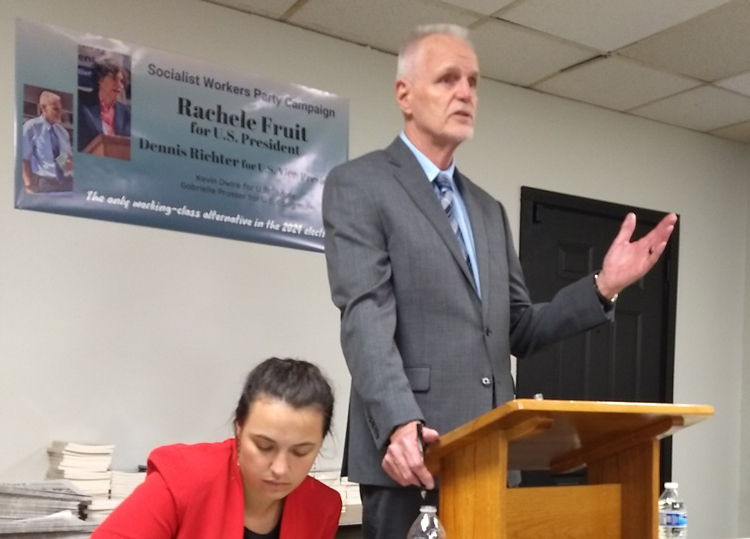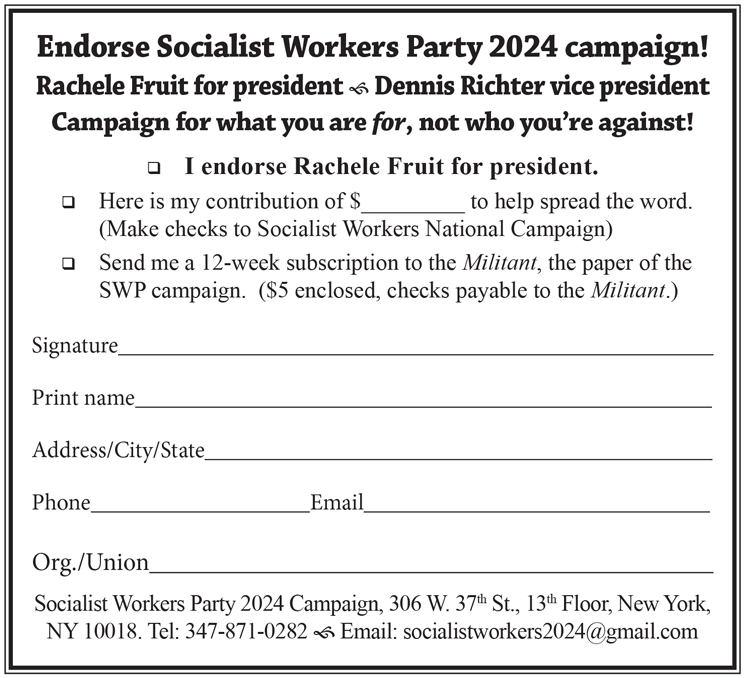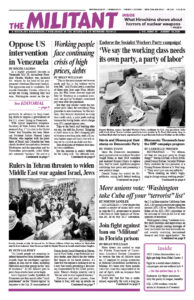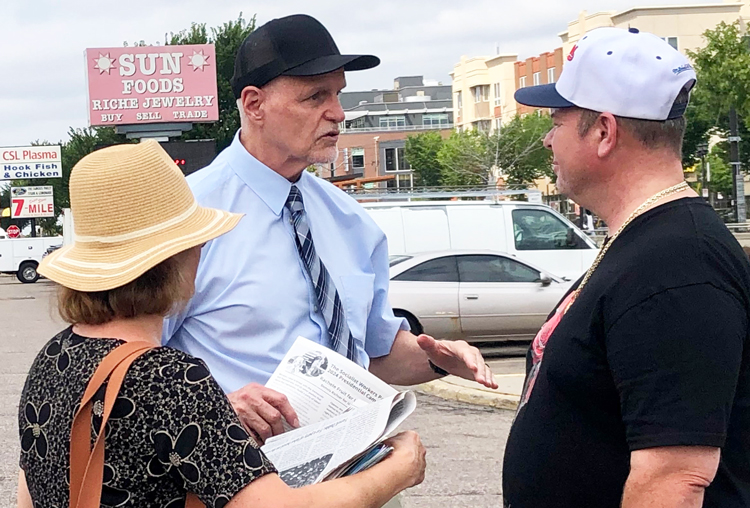Minnesota: Thousands hear the SWP campaign program
MINNEAPOLIS — “No offense, but how are you guys going to change things?” Steven Lutchen, a truck driver, asked Dennis Richter, Socialist Workers Party candidate for vice president, at a Hmong Farmers Market in St. Paul Aug. 4. “They won’t give you any publicity.”
“We’re counting on what’s beginning to change among working people,” Richter replied, pointing to recent labor struggles, from flight attendants fighting for a new contract to the autoworkers strike last fall.
“We need to build a party of labor, to organize to fight in the interests of all working people,” Richter said. “For years the unions have been supporting so-called friends of labor in the Democrats, and they’ve been getting weaker. Working people need to break with the bosses’ parties.
“Look at the example of the Teamsters in Minneapolis in the 1930s,” Richter said, pointing to the strike battles by truck drivers here that transformed the union and opened the door to independent working-class political action. “I’ve heard about that,” Lutchen said. “But look what they did to the leaders.”
“Yes, the Roosevelt administration used the FBI to go after unions leading up to World War II,” Richter said. They framed up and imprisoned leaders of the Teamsters and the Socialist Workers Party under the thought-control Smith Act. “That’s why it’s so important to defend constitutional freedoms today.”
Lutchen signed the petition to put the SWP presidential ticket on the ballot.

The Socialist Workers Party campaign has completed a 16-day effort to collect the required signatures of qualified voters to put the SWP ticket of Rachele Fruit for president and Richter on the ballot in Minnesota. Campaigners collected over 2,400 signatures — more than 20% above Minnesota’s requirement. Thousands of workers learned about the Socialist Workers Party’s fighting working-class program.
Cat Line was happy to have Joanne Murphy knock on her door Aug. 4. “I’m working two jobs now. There’s no way I can have kids,” she said.
“The crisis of capitalism means many young workers are unable to start a family,” Murphy said. “The unions need to lead the fight for women’s emancipation, starting with the ability to have and care for a family. That means leading a fight for higher wages, better work schedules and benefits. For government-funded child care, health care, sex education, as well as access to contraception and decriminalization of abortion.”
Campaigners traveled all across the state. A team went to Rochester, in the southeast, where they ran into nurses organizing a union. Another went to Crookston, in Minnesota’s Red River Valley, in the northwest. At a trailer park there, they met five workers from the New Flyer bus manufacturing plant, members of Communications Workers of America Local 7304. Two got Militant subscriptions. Teams campaigned in St. Cloud, Red Wing, Alexandria, and other cities and towns.
Richter spoke at a public meeting here Aug. 3. He described shifts taking place in the presidential race. “The U.S. rulers have taken steps to establish a little stability in their two parties to bring workers back into their two-party system and force them to choose a ‘lesser evil,’” he said.
“We saw how the Democrats shoved Joe Biden out of the race, replacing him with Kamala Harris. This advances a shift that Barack Obama began, to base the party on the ‘enlightened cosmopolitan meritocracy.’ At the same time, the Republicans led by Donald Trump are trying to reposition themselves as the ‘party of the workers.’”
But both parties represent the interests of the ruling-class families. “Every question we face needs a class answer — from high prices to unemployment, to work schedules and conditions that make it impossible to start and support a family,” he said.
“They need unemployment, to keep us competing for jobs and hold down pay. We say everyone has a right to work. A labor party would fight for a government-funded public works program providing jobs at union-scale wages to build the things we need.”
Jenny Benton, a cashier at a hardware store who has joined in the ballot effort, asked, “How would a party of labor address sharpening social relations? There’s growing numbers of adolescents who are alienated, who turn to heavy use of marijuana and other drugs. And adults too.”
“A labor party will only become possible through more active struggles by the working class,” Richter said. He described how crime, drug use and domestic violence decrease during upsurges in working-class struggles, such as the mass union movement in the 1930s and the battles for Black rights in the 1960s.
“We change ourselves in struggle. The dog-eat-dog system of capitalism promotes alienation and aggressiveness toward others. Human solidarity grows as working people fight together and have a reason to be disciplined.”
Endorse the SWP campaign!
People at the meeting were encouraged to endorse the SWP campaign.
The following day at a farmers market, Richter spoke with college student Abdul Sesay. He told Richter he’s concerned about how countries in Africa are being strangled by debt, including Niger and his home country, Sierra Leone. “China is making all kinds of loans they say are for development, but they end up taking all the resources and there’s no development.”
“The aim of the capitalist rulers everywhere is to extract profits, not develop what people need,” Richer said. “Today the competition between the ruling classes in the U.S., China and elsewhere are getting sharper. And that’s the foundation for more wars.”
Richter raised the course led by Thomas Sankara, who headed a popular revolutionary government in the West African country of Burkina Faso in the 1980s. “He pointed to the mobilization of working people to begin to transform society. Building parties with the perspective of putting workers in power is what’s needed, in Africa, Asia and here in the U.S.”
Sesay got a Militant subscription and We Are Heirs of the World’s Revolutions, a book of speeches by Sankara.
This successful effort puts the SWP campaign on good footing to respond to developments in the world, promote solidarity with working-class struggles, and grow.



